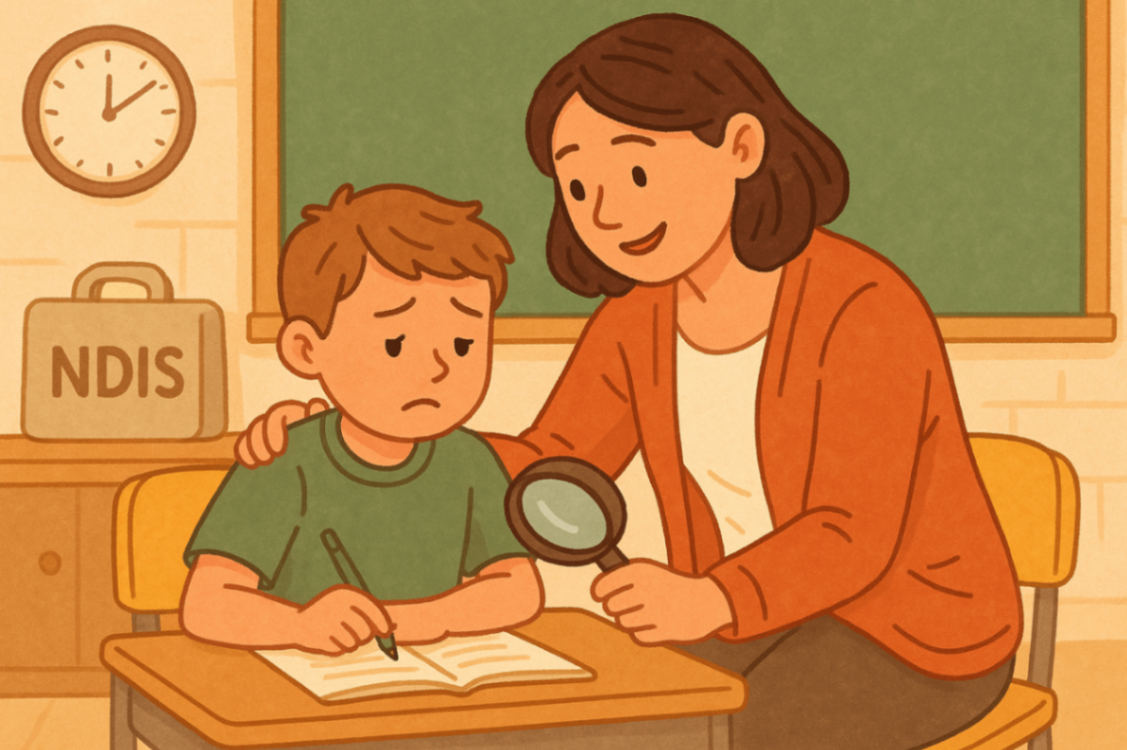
ndis behaviour therapy liverpool: collaboration with schools
31 July, 2025
Key Highlights
-
NDIS behaviour therapy in Liverpool is designed to address mental health challenges and support positive changes in daily life for students and individuals.
-
Collaboration between schools and an NDIS behaviour support practitioner helps create a supportive environment, enhancing students’ wellbeing and quality of life.
-
Cognitive behaviour therapy (CBT) and other therapeutic approaches are tailored to each person’s unique needs through consultation and assessment.
-
Behavioural therapy in Liverpool can be integrated into classrooms to manage routine and address challenging behaviours.
-
Accreditation and experience in neurodiverse and special needs populations are essential when selecting a provider for schools.
-
Access to NDIS and government-funded options ensures therapy is available to those who need it most
Introduction
Improving mental health and wellbeing is essential for every student’s success and happiness in daily life. The National Disability Insurance Scheme (NDIS) plays a crucial role in making therapy accessible to those in need, including in Liverpool. With the right NDIS behaviour therapy Liverpool support, young people facing challenges can gain the skills and confidence necessary for growth. In this blog, you’ll learn how NDIS behaviour therapy helps schools and teachers, what to look for in a provider, and how to create a welcoming, effective environment for every child.
Understanding NDIS Behaviour Therapy in Liverpool

NDIS behaviour therapy in Liverpool is a vital service for families and schools seeking support with mental health issues and developmental needs. Therapists use psychotherapy and individualized strategies to help people change unhelpful behaviours and build positive patterns. This approach goes beyond symptom management, aiming for overall progress in daily life.
By focusing on each person’s goals, behaviour therapists in Liverpool create tailored plans that foster long-term improvements. Schools, parents, and caregivers benefit from practical strategies to support children’s cognitive and emotional development, making lasting change possible. To see how tailored strategies come to life, explore Integrating Behaviour Support for Children into Everyday Routines.
What Is NDIS Behaviour Therapy?
NDIS behaviour therapy is a comprehensive program funded by Australia’s National Disability Insurance Scheme, supporting individuals who face mental health and behavioural challenges. In Liverpool, it’s accessible to those with eligible NDIS plans and is tailored through consultation, assessment, and ongoing review.
The therapy itself involves a range of evidence-based approaches, including counselling and cognitive behaviour therapy (CBT). CBT, in particular, helps people understand and change unhelpful thoughts and behaviours that affect their daily life, independence, and quality of life. Sessions may be held face-to-face or online, making therapy flexible and accessible.
If you’re seeking behavioural therapy in Liverpool, there are options across the city, from specialized clinics to in-school support. The right choice depends on your goals, needs, and whether your focus is on anxiety, autism, ADHD, or other issues. An initial consultation with an accredited provider helps you match services to your requirements for the best results.
Key Principles of Behavioural Interventions
Effective behavioural interventions rest on a set of guiding principles that shape how therapy is delivered in Liverpool’s schools and clinics. The primary goal is to foster a supportive environment where students and staff feel safe and empowered to address mental health problems.
Cognitive behavioural therapy (CBT) is a core strategy, using a practical approach that helps individuals identify and challenge unhelpful thoughts and feelings of anxiety. Key principles include:
-
Creating a safe space for open discussion and learning.
-
Teaching coping skills for anxiety, phobias, and low mood.
-
Setting realistic, personalized goals.
-
Monitoring progress with structured feedback.
-
Promoting positive routines and consistency.
-
Encouraging family and staff involvement.
The difference between general behavioural therapy and CBT is that CBT focuses specifically on how thoughts influence emotions and actions, while behavioural therapy targets actions themselves. Liverpool clinics often blend both, so you receive the right mix based on your needs.
How NDIS Behaviour Therapy Supports Schools

Schools benefit greatly from NDIS behaviour therapy, as it introduces structured support for students with mental health problems. By working alongside teachers, therapists create a safe space where children can learn new coping strategies and feel supported in their growth.
With practical behaviour plans and regular consultation, students are less likely to experience overwhelming anxiety or disruptive incidents. The combination of a supportive environment and evidence-based interventions helps create a school culture that values wellbeing and inclusivity. Let’s look at how teachers and staff fit into this partnership. For tips on getting the most from your practitioner, read Working Effectively with Your NDIS Behaviour Support Practitioner.
Collaborating with Teachers and Staff
Working together is key to a successful behaviour support program. Mental health professionals coordinate with teachers and school staff, holding regular consultation sessions to review challenges and progress. This collaboration ensures that support strategies are tailored to each student’s needs, not just applied as a one-size-fits-all solution.
By sharing insights and feedback, teachers help fine-tune behaviour plans and make adjustments in real time. This creates an environment where everyone is working towards the same goal: improving students’ quality of life at school and beyond.
If you’re searching for an accredited behavioural therapist in Liverpool, look for those who value teamwork and regular communication. The best outcomes are achieved when therapists, staff, and families partner closely to support every child’s unique journey.
Integrating Behaviour Support Plans in the Classroom
Implementing behaviour support plans in the classroom can transform the daily life and wellbeing of students. These plans are practical, actionable guides designed to address specific challenges and support routine.
Key elements include:
-
Clear, consistent routines that help students know what to expect.
-
Visual aids and prompts to reinforce positive behaviour.
-
Regular check-ins to monitor emotional wellbeing and progress.
-
Adaptations for individual learning styles and needs.
-
Flexible support for transitions or challenging moments.
Behavioural therapy in Liverpool can help address a variety of mental health conditions, such as anxiety, ADHD, or autism. When a plan is well integrated, teachers and students benefit from fewer disruptions, more positive interactions, and a classroom that feels truly inclusive. This approach gives everyone the tools to thrive.
Choosing the Right Behaviour Therapist for Your School

Selecting a suitable behaviour therapist for your school is critical. Start with a consultation to discuss your students’ needs and ensure the provider is accredited by NDIS. Experience with cbt therapy and school settings should be a priority, as these therapists understand the unique challenges of classrooms.
Look for professionals who offer more than one approach and who are willing to involve teachers and families in the process. The right fit will make a lasting difference for your students’ academic and social development.
Qualifications to Look for in NDIS Providers
When evaluating NDIS providers for school-based therapy, it’s essential to check qualifications, accreditation, and relevant experience. Cognitive behaviour therapy (CBT) certification and NDIS registration are minimum requirements, but you should also look for hands-on experience with children and young people in educational settings.
A reliable therapist will gladly provide documentation of their credentials and describe their approach during a consultation. Below is a summary table outlining what to look for:
|
Qualification/Criteria |
Details/Importance |
|---|---|
|
NDIS Provider Registration |
Ensures the therapist is approved for funded support services |
|
CBT or Relevant Therapy Certification |
Confirms advanced training in cognitive, behavioural, or psychotherapy methods |
|
Accreditation (e.g., BABCP) |
Indicates adherence to professional and ethical standards |
|
School-based Experience |
Demonstrates familiarity with educational routines and student needs |
|
Consultation Skills |
Ability to work closely with teachers, staff, and families |
Finding someone with these qualifications increases the likelihood of a successful partnership.
Assessing Experience with Neurodiverse and Special Needs Students
Experience matters, especially when working with neurodiverse students or those with special needs, including ADHD, OCD, or autism spectrum disorders. A skilled therapist adapts strategies to suit each learner, recognizing that what works for one may not help another.
Ask potential therapists about their familiarity with specific diagnoses, and request examples of successful interventions for similar students. "Every student deserves a tailored approach," says Charles Bradshaw, BACP-registered counsellor, "and the right therapist empowers children to find their strengths."
Behavioural therapy can address a wide range of neurodevelopmental conditions. In Liverpool, NDIS providers are trained to support not just learning, but also emotional regulation, social interaction, and independence. If your school serves a diverse population, be sure to choose a therapist with demonstrated success in special needs environments.
Conclusion
NDIS Behaviour Therapy plays a pivotal role in enhancing the educational experience for students with diverse needs. By fostering collaboration between therapists, teachers, and staff, schools can create an inclusive environment that supports positive behavioural outcomes. Understanding the key principles of behaviour interventions and integrating tailored support plans into the classroom not only benefits students but also empowers educators to implement effective strategies. The right NDIS providers, with experience in working with neurodiverse and special needs students, can make all the difference in achieving successful outcomes.
Ready to bring NDIS behaviour therapy Liverpool into your school and empower every student? Book your consultation today to transform your approach to inclusive education.
Frequently Asked Questions
Can NDIS behaviour therapy help address challenging behaviours at school?
Absolutely. NDIS behaviour therapy, especially through cognitive behaviour therapy strategies, helps schools create a supportive environment. It equips students and staff to manage challenging behaviours, reduces disruptions, and improves overall wellbeing. The approach is tailored to each school’s needs, making a visible difference.
Are there free or government-funded behavioural therapy options for schools in Liverpool?
Yes. NDIS funding makes behavioural therapy more accessible, and some government-funded programs are available in Liverpool. Schools can schedule a consultation with a registered NDIS provider to understand eligibility and get support navigating the application process, ensuring therapy is within reach for every student.
What outcomes can teachers and students expect from school-based behaviour therapy?
Teachers and students can expect improved quality of life, better routines, and enhanced daily life at school. Outcomes include fewer behavioural issues, more positive interactions, and a classroom atmosphere that promotes learning, cooperation, and emotional wellbeing for all.
.svg)






